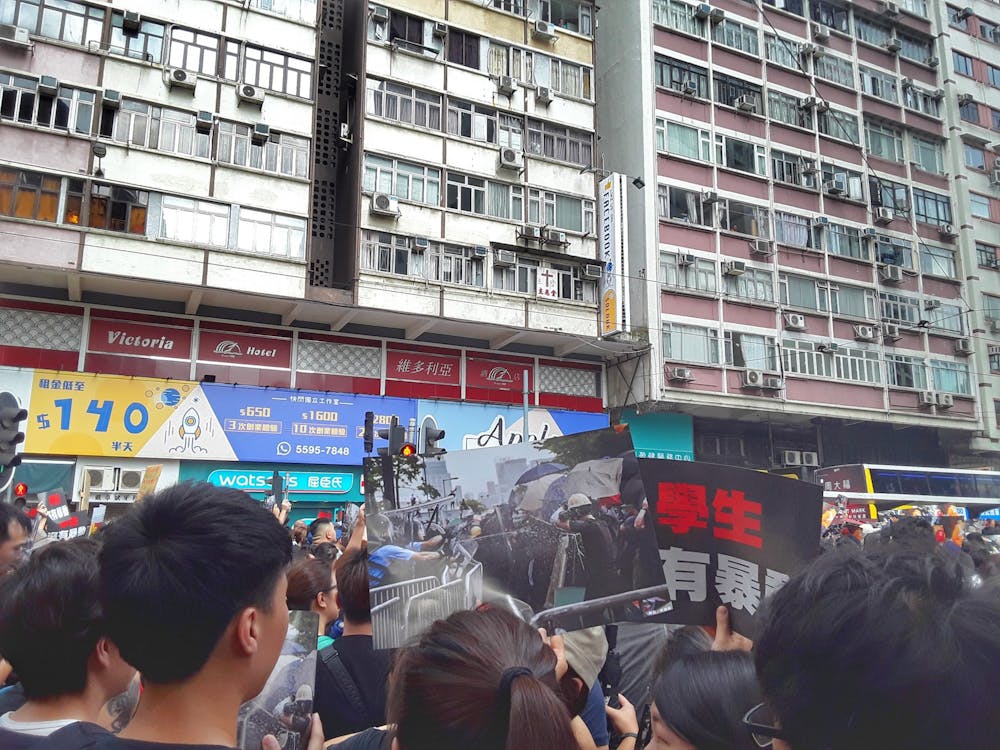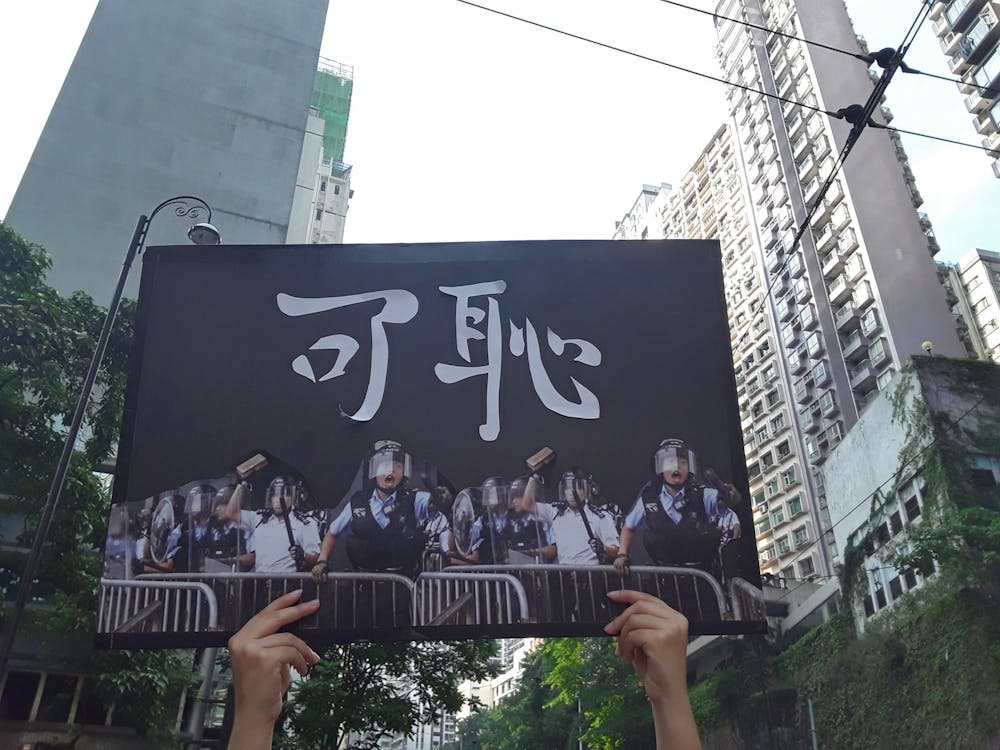As we enter our 12th week of classes, South China Morning Post’s weekly updates remind me that Hong Kong is entering its 23rd week of unrest and violence.
It feels as if it were such a long time ago when I was in Hong Kong, living through eight of those weeks of unrest.
I arrived in Hong Kong in June, a few days after the protests on June 12 when the Hong Kong police used pepper spray, batons and tear gas against protesters for the first time. It was my second summer in Hong Kong, with the first being that of 2018. During both summers, I interned with the same education nonprofit for eight weeks, teaching mathematics to underprivileged students from local secondary schools.
Although most of the interns tried to be aware of the situation and what could follow, we didn’t initially face any inconveniences in our schedules, nor did we feel unsafe in the city.

Citizens gathering in Hong Kong for Anti- Extradition Law Amendment Bill protests.
In fact, it felt pretty good to be back and I was excited to make some new memories with new and old friends in a place that I had truly fallen in love with during my first summer.
On June 16, I attended the second mass Anti-Extradition Law Amendment Bill (Anti-ELAB) protest that took place on Hong Kong Island. It is estimated that two million people joined that peaceful protest, and I was able to talk to many of the young people marching that day, listening to their perspectives and empathizing with them.
After a two-week teaching training, my colleagues and I were about to head into the first week of classes. We were informed that week of a student’s suicide that was linked to the Anti-ELAB protests, which worried both our supervisor and us about the larger effects of the Anti-ELAB protests on students’ mental health.
Our students were mostly between the ages of 13 and 15, meaning they were old enough to generally understand what was going on in Hong Kong, but not mature enough to know how to process all their thoughts and feelings.
My supervisor prompted all teachers to pay attention when interacting with students for any suicide warning signs, such as hopeless feelings, mood swings, anxiety and anger, especially linked to the current state of the city. Most of the students were indeed quite aware of what was going on in the city and they had strong opinions about it.
The roughest school day was the morning after the Yuen Long mob attacks. The night of July 21, dozens of men in white, some later identified as members of triad (organized crime) groups, attacked demonstrators, who were returning from protests to their homes, in the Yuen Long metro station.
The graphic images and videos from the violent attacks were circulating all over the news and social media outlets. Some of us went to bed seeing these images and some woke up to them the following morning.
Enjoy what you're reading?
Signup for our newsletter
During our July 22 morning staff meeting, teachers were instructed not to initiate conversations related to the attacks with the students in case they didn’t feel comfortable talking about them.
However, we were advised to listen and reaffirm feelings of love, care and hope toward the students, in case they themselves initiated a conversation with us.
In addition, we were asked not to try to impose our own views on the students.
Many teachers expressed their dilemma over what our duty and responsibility was to our students: to be real or to be entertainers.
Should we be honest that our mood was down because of the events of the previous night, that we were as confused as our students, perhaps even more, as to why this violence had happened? Or should we act in a joyful, energetic and carefree way, as if nothing bad had happened, and make the kids smile and kind of forget about it temporarily?
These are questions that I still don’t have the answers to, nor did anyone in the staff room that morning. For me, the answer is somewhere in the middle, although I doubt there is a strictly right or wrong answer.
In the following weeks, the situation in Hong Kong started escalating and it continued to escalate as my mother came to visit during the last week of my internship in early August. The big city-wide strike on Aug. 5 and a few strikes, protests and clashes that followed disrupted transportation within the city, while the police’s use of tear gas in residential areas and police’s clashes with protesters made the city increasingly unsafe.
Although I thought things couldn’t get more intense for me, my last day in Hong Kong proved me wrong.
On Aug. 13, my mom and I headed to the Hong Kong International Airport to depart. I had a 6:30 p.m. flight to Richmond, Virginia, and my mother had an 11 p.m. flight back home to Greece.
We had checked in our bags and had gotten our boarding passes already at the Hong Kong metro station earlier in the day. When we arrived at the airport around 4 p.m., we encountered thousands of protesters in the arrivals and departures halls, holding what seemed to be a peaceful demonstration.
Some were holding flyers, posters and banners, others were stopping travelers to show them videos of the police brutality on their laptops, others were chanting, “Free Hong Kong” and many more were on their phones.
My mom and I approached the boarding pass checkpoints but found out that dozens of protesters had blocked them using luggage carts, preventing travelers from getting through. I tried talking with them to let me through, but I got responses such as, “It’s not us blocking the entrance; it’s the airport staff,” or: “All flights are canceled anyway. There’s nowhere to go even if we let you through.”
Although I’m not sure whether the first response is true or false, I can guarantee the second one was pure misinformation, as my own flight was not canceled and eventually departed without me.
Soon protesters started appearing with cardboard boxes of water bottles, juices, granola bars and McDonald's Big Macs, and handed them out to travelers, apologizing for the inconvenience they caused. Although that was kind of them, it did make me question the origins of this sizable, well-organized supply and distribution of food.
In the meantime, I was on the phone with my internship supervisor, who was trying her best to reschedule my flight for the following morning.
Around 10 p.m., riot police arrived and the protesters dispersed, allowing travelers to enter through the boarding pass checkpoint.
Thankfully, my mom was able to pass through and she made it to her 11 p.m. flight. Because my flight had departed already, I had to spend the night at the airport and waited to board a morning flight.
During this intense 22 hours spent at the Hong Kong airport, I was thankful to have the great support of my internship supervisor in Hong Kong and staff from the Office of International Education at the University of Richmond who were constantly checking in with me over the phone or email.
When I arrived in Richmond, I received various reactions from friends upon their hearing I spent my summer in Hong Kong, from “Oh, I’m sorry!” to “You witnessed history right there!”
My own reaction is that it was intense, but I’m not sorry. In fact, I wouldn’t change a thing about it.
I had the privilege of working with inspiring colleagues on issues like education and youth at an organization I’m passionate about and always brings out the best in me. In a time of political turbulence, no matter how each teacher acted, I believe we achieved the result we wanted.
I saw many smiles in the main hall and classrooms, which to me indicated students felt happy to be there, and I also saw some tears, which may have indicated students felt safe to be vulnerable and express their emotions around us.
Despite the bittersweet goodbye that Hong Kong gave me, I still keep the good memories: catching sunsets at Kennedy Town, watching the light show over the Victoria Harbor skyline, grabbing dim sum at Tim Ho Wan and egg waffles on Chai Wan Road after work, hiking to Shek O Beach and many more.
I wish people who have been to Hong Kong can always remember it as something more than unrest and violence.
Finally, although I did witness history there, I was not the one making it. Part of my heart is always with the people in Hong Kong who are making it. I hope Hong Kong sees peace soon.
Contact contributor Myrsini Manou-Georgila at myrsini.manougeorgila@richmond.edu.
Support independent student media
You can make a tax-deductible donation by clicking the button below, which takes you to our secure PayPal account. The page is set up to receive contributions in whatever amount you designate. We look forward to using the money we raise to further our mission of providing honest and accurate information to students, faculty, staff, alumni and others in the general public.
Donate Now



